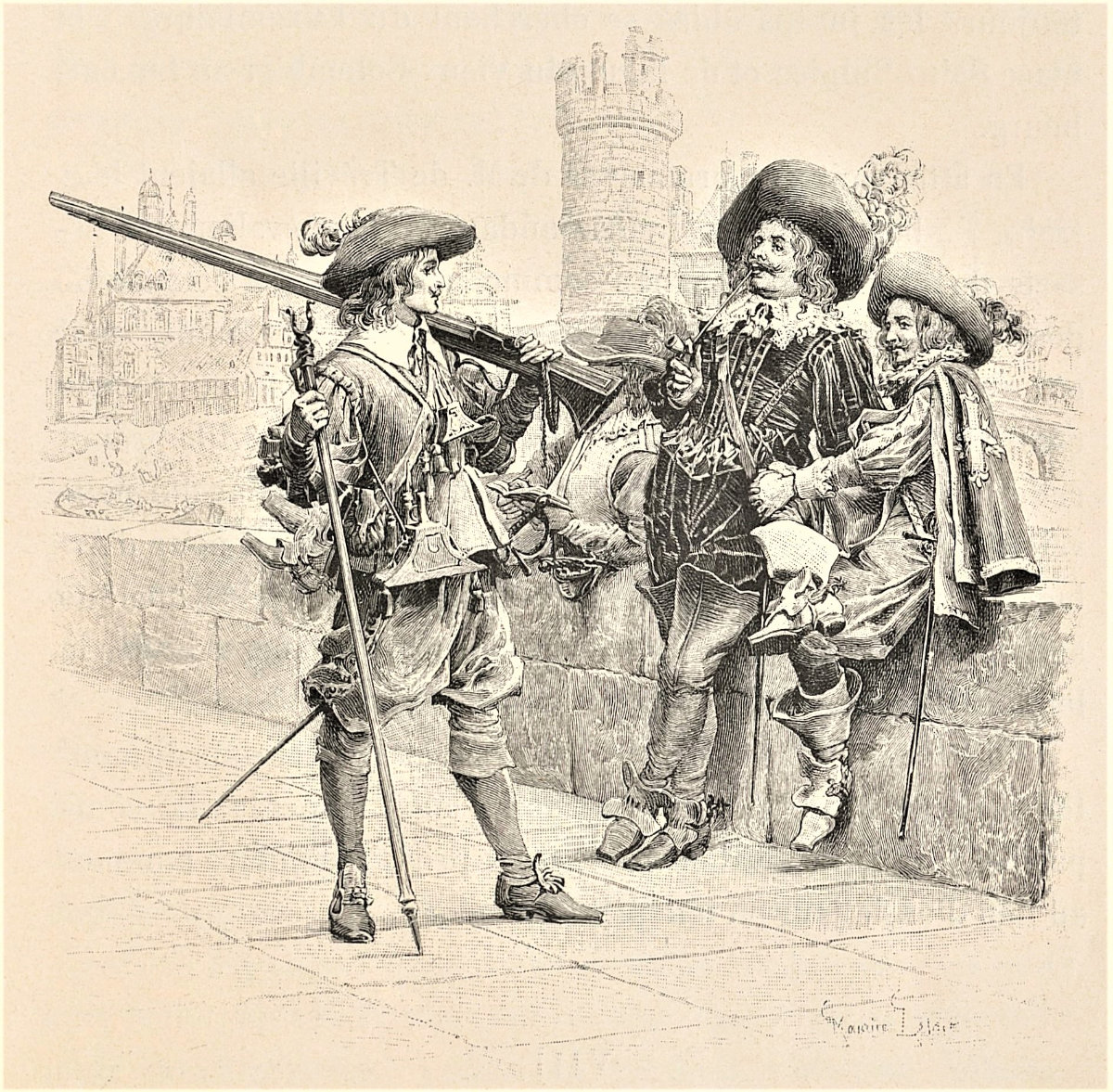Porthos, Baron du Vallon de Bracieux de Pierrefonds is a fictional character in the novels The Three Musketeers (1844), Twenty Years After (1845), and The Vicomte de Bragelonne (1847–1850) by Alexandre Dumas, père. He and the other two musketeers, Athos and Aramis, are friends of the novel’s protagonist, d’Artagnan. Porthos is a highly fictionalized version of the historical musketeer Isaac de Porthau. In The Three Musketeers, his family name is du Vallon. In Twenty Years After, having made a financially advantageous marriage, his surname is du Vallon de Bracieux de Pierrefonds. He eventually earns the title of Baron. His real first name is never given; “Porthos” is a nom de guerre, assumed upon joining the Musketeers. Porthos, honest and slightly gullible, is the extrovert of the group, enjoying wine, women and song. Though he is often seen as the comic relief, he is also extremely dedicated and loyal toward his friends and fellow Musketeers and stands out for his physical strength and size. His eating abilities even impress King Louis XIV during a banquet at Fontainebleau. As the story advances, he looks more and more like a giant, and his death is that of a titan. At the time of The Three Musketeers (ca. 1627), he apparently has few lands or other resources to draw from. He is finally able to extract sufficient funds from an elderly lawyer’s somewhat younger wife (whom he was romancing and later married) to equip himself for the Siege of La Rochelle.
| Alias Porthos |
| Real Names/Alt Names Porthos, Baron du Vallon de Bracieux de Pierrefonds |
| Characteristics Hero, Swashbuckler, Film Characters, Literary Characters, Wold Newton Universe, Scientific Revolution, French |
| Creators/Key Contributors Alexandre Dumas |
| First Appearance “Les Trois Mousquetaires” serialized in Le Siècle (March to July 1844) |
| First Publisher Meline, Cans, et Compagnie, Brussels |
| Appearance List “Les Trois Mousquetaires” serialized in Le Siècle (March to July 1844). Novels: The Three Musketeers (Les Trois Mousquetaires, 1844); Twenty Years After (1845); The Vicomte of Bragelonne: Ten Years Later (1847-50). Film: The Three Musketeers (1903) by Georges Melies; La maschera di ferro (1909); The Three Musketeers: Part 1 and Part 2 (1911); The Three Musketeers (silent, 1914); The Three Musketeers (silent, 1916); A Modern Musketeer (1917); Les Trois Mousquetaires (serial, 1921); The Three Musketeers (US, 1921) featuring Douglas Fairbanks; The Three Musketeers (12-episode serial, 1933). Comics: Black Cat Mystery #49, Jackpot Comics #6, Kid Eternity #1 and 4, Hit Comics #41 and 55. |
| Sample Read The Three Musketeers [Internet Archive] |
| Description Porthos, Baron du Vallon de Bracieux de Pierrefonds is a fictional character in the novels The Three Musketeers (1844), Twenty Years After (1845), and The Vicomte de Bragelonne (1847–1850) by Alexandre Dumas, père. He and the other two musketeers, Athos and Aramis, are friends of the novel’s protagonist, d’Artagnan. Porthos is a highly fictionalized version of the historical musketeer Isaac de Porthau. In The Three Musketeers, his family name is du Vallon. In Twenty Years After, having made a financially advantageous marriage, his surname is du Vallon de Bracieux de Pierrefonds. He eventually earns the title of Baron. His real first name is never given; “Porthos” is a nom de guerre, assumed upon joining the Musketeers. Porthos, honest and slightly gullible, is the extrovert of the group, enjoying wine, women and song. Though he is often seen as the comic relief, he is also extremely dedicated and loyal toward his friends and fellow Musketeers and stands out for his physical strength and size. His eating abilities even impress King Louis XIV during a banquet at Fontainebleau. As the story advances, he looks more and more like a giant, and his death is that of a titan. At the time of The Three Musketeers (ca. 1627), he apparently has few lands or other resources to draw from. He is finally able to extract sufficient funds from an elderly lawyer’s somewhat younger wife (whom he was romancing and later married) to equip himself for the Siege of La Rochelle. |
| Source Porthos – Wikipedia |

